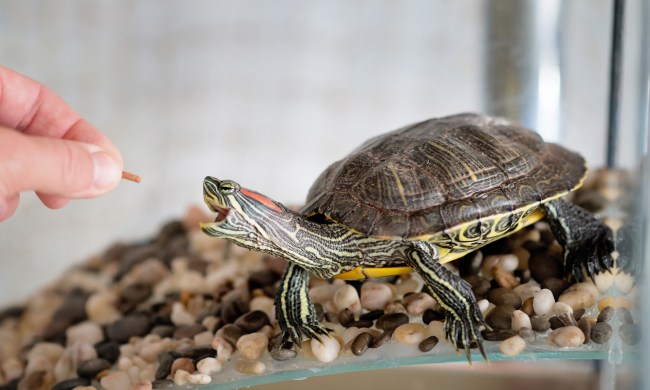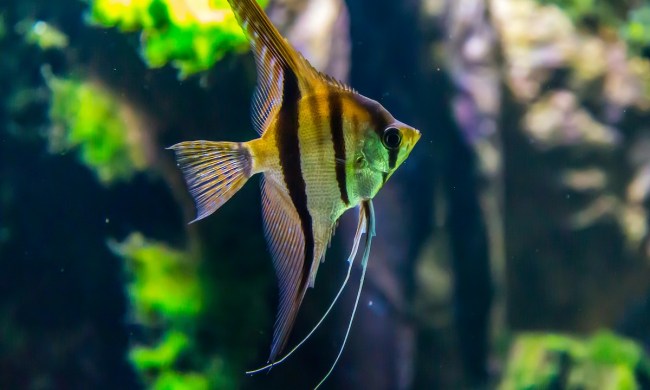We humans use our hands for nearly everything — from cooking our meals to offering a friendly greeting. Navigating their world by hand isn’t an option for birds. Instead, they have to use their claws or their beaks to interact with their environment. Just like puppies, birds bite and chew to explore their world. They also use “beaking” to communicate with you and other birds. Using their beak to nudge, mouth, or bite is a bird’s way of making a point. Biting and beaking are natural behaviors in birds and are not a cause for concern. But when your birds are incessantly biting, injuring you or your other birds, it might be time to nip that nipping in the bud.
Why does my bird bite?
Begin teaching your bird how to stop biting by understanding why it is biting. There are four significant reasons that a bird begins to bite other birds.
Mating
When bird hormones are in full force, watch out for aggressive mating behavior from the males. This behavior could be directed at other males to win over the female or at the females themselves during courting and mating. Different species behave differently, and it’s essential to familiarize yourself with your bird’s mating habits so you can prepare to intervene.
Territory
Like most animals, birds can become territorial and try to assert their dominance. If you’re noticing one bird chasing another away from things such as toys, food, or water, keep an eye out and make sure the less dominant bird (the one being chased away) is getting enough of those resources. Most likely, this behavior will taper off as the birds work out who’s boss. If it persists, it might be time to separate them.
Unhappiness
If someone makes you mad in some way, you’re likely to retaliate, and birds are no different. Biting can be a sign that your bird is unhappy and probably angry, whether at another bird for taking a treat or toy or at you for not holding it just right. An unhappy bird is liable to lash out with a bit of biting.
Youth
Just like teething toddlers, young birds may bite more often than older birds. This should not be a cause for concern. Be on the lookout for injury to your other birds, and if the behaviors cause further problems or aren’t stopping, consider separating your birds.
Why does my bird bite me?
Besides biting other birds, your birds may be pecking you and causing painful scrapes and cuts. Here are the main reasons birds bite their humans.
Fear
If your bird is new or had a previous owner, it might possibly be biting you out of fear. Without adequate handling and acclimation to its new surroundings, your bird may feel frightened and start trying to protect itself.
Playing
Just like playful puppies who mouth your hand, your bird may be trying to play with you by biting you. Although this isn’t acceptable behavior, it’s good to bring some perspective to the situation and not assume your bird is being mean on purpose.
Pain
When you stub your toe on a chair leg, you probably don’t find a joke about it all that funny. Similarly, when birds are in pain, they are more likely to bite you or other birds. This is their way of telling everyone they want to be let alone or to protect themselves from being hurt more.
Hormones
Adolescent birds are more likely to bite you. It’s hormonal. But this behavior will probably pass as their hormones settle down and they get back into their usual rhythm. As always, if the biting persists, consider separating out the nippier ones or look into training your birds to stop biting.
How to stop a bird from biting
Birds bite for many reasons, but no matter the reason, you want your bird to stop biting you or other birds. Here are some tips and techniques to retrain your bird to stop biting.
- Listen to your bird
- When you’re having a bad day and someone won’t let you alone, you might bite them too. Watch your bird’s body language: If it is trying to tell you it’s not in the mood, let it be. Learning to read your bird’s body language and listen to your bird will teach you to give it space when it needs it.
- Build trust
- Building trust with your birds through listening and respecting them will mean less biting. When your bird knows you won’t pick it up when it doesn’t want to be, or that when you do, you’ll handle it with care, your bird can relax knowing it’s safe with you. Forcing your bird to do things it doesn’t want to do will not earn its trust and results in more biting.
- Ignore, don’t react
- If your bird is biting, ignore it. When your bird bites you, and you pull back and screech, you may be giving the bird the reaction it was looking for. A dog will bark at the mail carrier every day because it thinks it wins when the mail carrier always leaves. Avoid teaching your birds that biting gets them what they want.
- Don’t get mad
- Animals do not understand human anger. Never yell or physically discipline your bird in any way. These actions will lose your bird’s trust and cause it to fear you.
- Bite this, not me
- One way to avoid getting bitten is to offer your bird a stick instead of your hand. This is sometimes called stick training and can be an excellent way to say, “Bite this, not me.”
Whether your bird is biting you or your other birds, it can be a frustrating time. With the knowledge of why they bite and these tips and techniques to stop biting behavior, you can get back to enjoying your birds!



